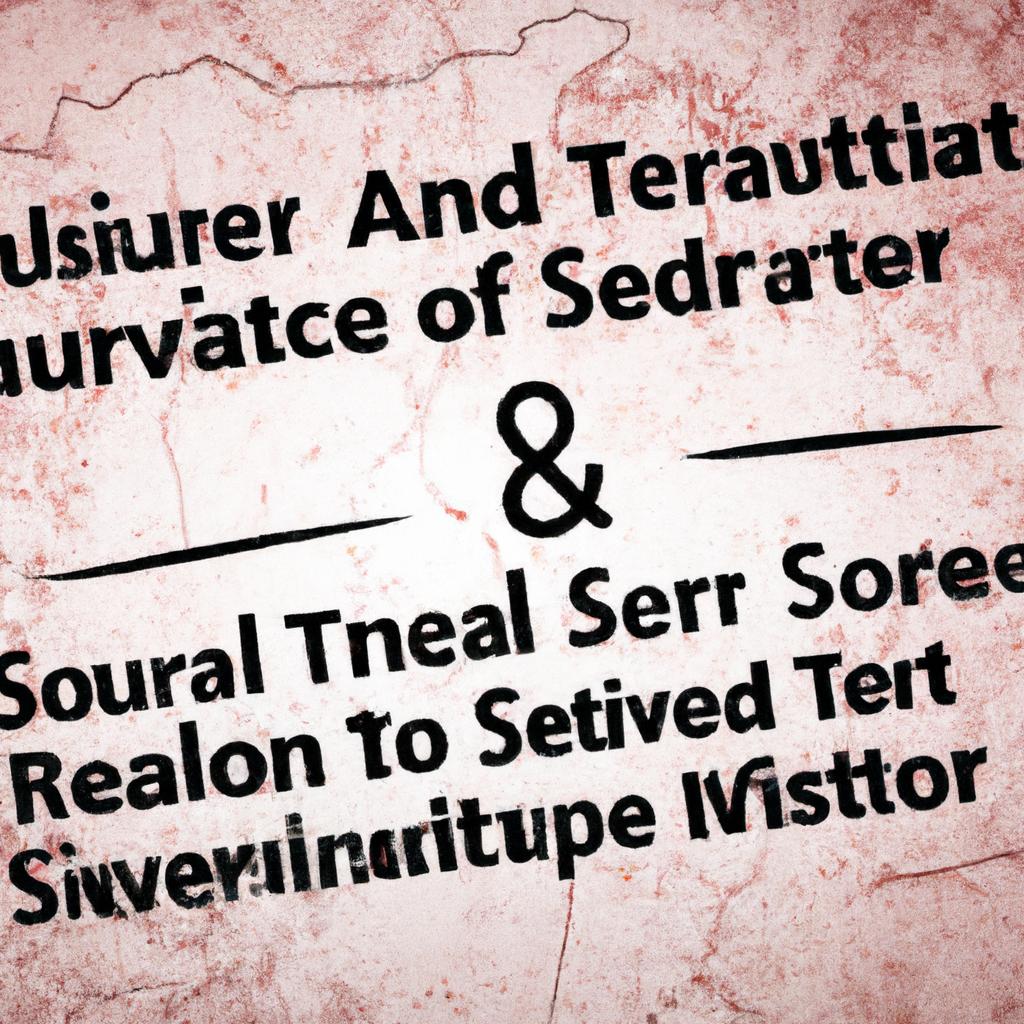In the intricate realm of estate planning and trust administration, the question of whether a survivor’s trust is revocable or irrevocable holds significant implications for both grantors and beneficiaries. As experienced legal practitioners at Morgan Legal Group in New York City, we navigate the complexities of trust structures with precision and attention to detail. In this article, we delve into the nuanced distinction between revocable and irrevocable survivor’s trusts, shedding light on the key considerations that impact the validity and flexibility of these crucial instruments. Whether you are seeking clarity on trust administration or contemplating your own estate planning strategies, our insights will illuminate the path forward.
Understanding the Difference Between Revocable and Irrevocable Survivor’s Trusts
When it comes to estate planning, is crucial. A revocable survivor’s trust, also known as a living trust, allows the trust creator to make changes or revoke the trust during their lifetime. This type of trust offers flexibility and control over assets while also avoiding probate. On the other hand, an irrevocable survivor’s trust cannot be changed or revoked once created. While this may limit flexibility, it offers benefits such as asset protection and potential tax advantages.
It is essential to carefully consider your goals and needs when deciding between a revocable and irrevocable survivor’s trust. Factors such as asset protection, control over assets, and tax implications should all be taken into account. Consulting with an experienced estate planning attorney at Morgan Legal Group can help you navigate the complexities of survivor’s trusts and create a plan that meets your unique needs and objectives.

Factors to Consider When Deciding Between Revocable and Irrevocable Survivor’s Trusts
involve various aspects that can significantly impact your estate planning goals. **Understanding the key differences between these two types of trusts is crucial in making an informed decision that aligns with your specific needs and preferences.** Here are some essential considerations to keep in mind when determining whether a survivor’s trust should be revocable or irrevocable:
-
Flexibility vs. Control: One of the fundamental distinctions between revocable and irrevocable survivor’s trusts is the level of flexibility and control you have over the trust assets. With a revocable trust, you retain the power to modify or revoke the trust at any time, whereas an irrevocable trust cannot be changed once it is established.
-
Asset Protection: Irrevocable survivor’s trusts offer enhanced asset protection benefits, as the assets transferred to the trust are no longer considered part of your estate. This can be particularly advantageous for individuals looking to safeguard their assets from creditors, lawsuits, or potential estate taxes. On the other hand, revocable trusts do not provide the same level of protection, as the trust assets are still considered part of your estate for legal purposes.
In conclusion, the decision to create a revocable or irrevocable survivor’s trust should be carefully considered based on your unique circumstances and estate planning objectives. Consulting with an experienced estate planning attorney can help you navigate the complexities of trust planning and ensure that your assets are protected and distributed according to your wishes.
Benefits and Drawbacks of Revocable Survivor’s Trusts
In the realm of estate planning, one common question that arises is whether a survivor’s trust is revocable or irrevocable. A revocable survivor’s trust, also known as a living trust, provides flexibility and control during the lifetime of the trust creator. This type of trust allows the trust creator to make changes, add or remove assets, or even revoke the trust entirely if desired. The survivoring spouse generally becomes the successor trustee after the trust creator’s passing, ensuring seamless management and distribution of assets.
On the other hand, there are drawbacks to revocable survivor’s trusts as well. Some of the key disadvantages include the need for ongoing maintenance and potential costs associated with trust administration. Additionally, assets placed in a revocable trust are typically not protected from creditors or lawsuits. Understanding the benefits and drawbacks of a revocable survivor’s trust is crucial when creating an estate plan that meets your specific needs and goals.

Navigating the Legal Implications of Revoking a Survivor’s Trust
can be a complex and sensitive matter. One of the primary questions that often arises in these situations is whether a survivor’s trust is revocable or irrevocable. The answer to this question can have significant implications for both the survivor and any beneficiaries named in the trust.
It is crucial to understand the terms of the trust documents and the applicable state laws when determining the revocability of a survivor’s trust. In general, a survivor’s trust may be either revocable or irrevocable, depending on the specific language used in the trust instrument. Some key considerations to keep in mind when evaluating the revocability of a survivor’s trust include:
- The language used in the trust document
- The intentions of the trust creator
- The impact of revoking the trust on the surviving spouse or other beneficiaries
Q&A
Q: Is a survivor’s trust revocable or irrevocable?
A: The answer to this question depends on the specific terms of the trust.
Q: Can a survivor’s trust be changed after it is created?
A: Some survivor’s trusts are revocable, meaning they can be altered or revoked by the creator. Others are irrevocable, meaning they cannot be changed once they are established.
Q: What are the benefits of a revocable survivor’s trust?
A: A revocable survivor’s trust allows the creator to maintain control over their assets and make changes as needed.
Q: Are there any downsides to a revocable survivor’s trust?
A: One potential downside is that assets held in a revocable trust are still considered part of the creator’s estate for tax and creditor purposes.
Q: What are the advantages of an irrevocable survivor’s trust?
A: An irrevocable survivor’s trust can provide more protection for assets and may offer certain tax benefits.
Q: Are there any limitations to an irrevocable survivor’s trust?
A: Once an irrevocable trust is established, the terms cannot be changed, and the creator loses control over the assets held within it.
The Way Forward
In conclusion, the decision to make a survivor’s trust revocable or irrevocable ultimately depends on the individual’s specific circumstances and goals. Whether you choose to retain control over your trust assets or establish a secure, irrevocable plan, it is important to carefully consider all aspects of your estate planning strategy. Consult with a qualified estate planning attorney to discuss your options and determine the best course of action for your unique situation. Remember, the choice is yours – make it wisely.
 Survivor’s Trust: Understanding the Difference between Revocable and Irrevocable
Survivor’s Trust: Understanding the Difference between Revocable and Irrevocable
When it comes to estate planning, creating a trust is a popular way to ensure that your assets are distributed according to your wishes after your passing. A trust is a legal document that holds your assets and is managed by a trustee for the benefit of your chosen beneficiaries. One type of trust that is commonly used is the survivor’s trust, also known as a joint or spousal trust. This trust is established by married couples, and it allows for the transfer of assets to the surviving spouse upon the death of one partner.
If you are considering creating a survivor’s trust as part of your estate planning, you may have come across the terms “revocable” and “irrevocable” trust. These two terms refer to the terms of the trust and dictate whether the trust can be changed or modified in any way. In this article, we will delve into the difference between a revocable and irrevocable survivor’s trust and help you determine which option is the right one for you.
Revocable Survivor’s Trust
A revocable trust, also known as a living trust, is a trust that can be modified or revoked while the grantor (the person who creates the trust) is still alive and competent. In simpler terms, this means that the grantor has the power to make changes to the trust at any time during their lifetime. This type of trust is a great option for those who want flexibility and control over their assets, even after they have been placed in a trust.
In the case of a survivor’s trust, a revocable trust can be created by a married couple with the intention of allowing the surviving spouse to receive the assets upon the death of the other spouse. The grantor has the power to make changes to the trust, including adding or removing beneficiaries, changing the terms of distribution, and even terminating the trust altogether.
Benefits and Practical Tips:
– Flexibility and control: A revocable trust allows you to maintain control over your assets and make changes as needed throughout your lifetime.
– Probate avoidance: Assets that are placed in a revocable trust do not go through the probate process, which can save time and money for your loved ones.
– Privacy: The terms of a revocable trust do not become public record, unlike a will, which is subject to probate.
– Designate a successor trustee: A revocable trust allows you to designate a successor trustee to manage the trust after your passing, which can provide peace of mind.
Irrevocable Survivor’s Trust
On the other hand, an irrevocable trust is a trust that cannot be modified, changed, or revoked after it has been created. The grantor relinquishes their control over the trust and its assets, and the trust is managed by a trustee for the benefit of the beneficiaries. In the case of a survivor’s trust, once the trust becomes irrevocable upon the death of the grantor, the surviving spouse cannot make any changes to the trust.
One key difference between a revocable and an irrevocable trust is the tax implications. With a revocable trust, the assets are not considered separate from the grantor and are still subject to estate taxes upon their death. In contrast, with an irrevocable trust, the assets are considered separate from the grantor, which can result in significant tax savings. This makes an irrevocable trust an attractive option for those with larger estates.
Benefits and Practical Tips:
– Asset protection: Placing assets in an irrevocable trust removes them from the reach of creditors, lawsuits, and bankruptcy.
– Tax advantages: As mentioned, an irrevocable trust can provide significant tax savings for larger estates.
– Peace of mind: By creating an irrevocable trust, you can ensure that your assets are protected and distributed according to your wishes, even after you pass away.
Case Study
Let’s take a closer look at the case of James and Rachel, a married couple in their 60s who want to create a trust as part of their estate planning. They consider creating a survivor’s trust and are unsure whether they should make it revocable or irrevocable. After consulting with their estate planning attorney, they decide to create a revocable trust to have more control over their assets and the terms of the trust. However, they also decide to make the trust irrevocable upon the death of the first spouse to take advantage of the tax benefits.
First-Hand Experience
As you can see from the case study above, creating a trust can be a complex process, and choosing between a revocable and irrevocable trust can depend on various factors. It is essential to consult with an experienced estate planning attorney to determine the best option for your individual situation. They can assess your assets, goals, and needs to create a trust that will best serve you and your loved ones.
In Conclusion
In summary, a survivor’s trust can be both revocable and irrevocable, depending on the needs and preferences of the grantor. While a revocable trust provides flexibility and control, an irrevocable trust offers asset protection and tax advantages. It is crucial to understand the difference between the two and seek professional guidance to make the best decision for your estate planning needs. Remember, every situation is unique, so it is best to consult with an attorney to find the most suitable option for you.

